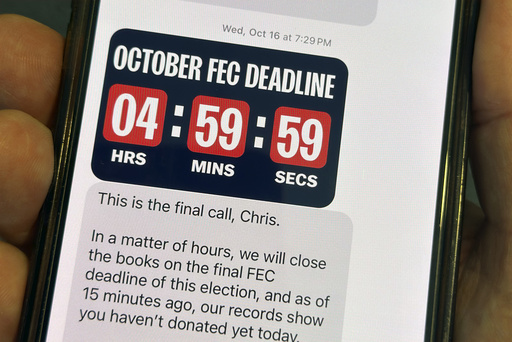WASHINGTON — For the countless Americans being targeted by the campaigns of Kamala Harris and Donald Trump, or their supporters, the impending doom of the nation seems to be just a text away.
Many texts suggest that the future of the country hangs in the balance, secretly urging recipients—be it Sally, Jose, or anyone else—to take action and contribute as little as $7.
Text messaging has become a swift and inexpensive method for reaching out to potential voters and donors without the regulatory constraints that govern conventional paid advertising. Both campaigns are utilizing this tactic with great intensity, resulting in a flurry of notifications that can feel perpetual in the campaign’s final stretch.
Robyn Beyah, waiting to enter a Kamala Harris rally near Atlanta, remarked on the constant influx of texts, saying, “All day, every day.” She even joked that the campaign was practically part of her social circle, adding that she views the barrage of messages as “harmless” because she feels connected to the candidate. However, not all recipients share her enthusiasm.
Ebenezer Eyasu, also in line for the Harris rally, admitted to tuning out the many daily texts he receives, perceiving them merely as “background noise.” Similarly, Sarah Wiggins, a 26-year-old graphic designer from Kennesaw, Georgia, prefers personal interactions over digital outreach. “I just delete, to be honest. I don’t want to read it,” she said, emphasizing the power of face-to-face connections.
Trump’s supporters are also experiencing similar bombardment. At a recent rally in Tempe, Arizona, several attendees expressed their mild frustration with the relentless messages. Morse Lawrence, a physician assistant, described the political texts as more annoying than useful amidst the numerous unrelated solicitations he receives. He observed that while many messages go unanswered, campaigns may still find some level of success, likening it to fishing where a few bites are still worthwhile.
Jennifer Warnke, a long-time Republican, acknowledged the irritation of receiving so many texts but also perceived it as a positive change, stating, “They’re at least reaching out, because for years nobody ever called me.” Still, she noted that the annoyance would soon pass as the election draws near.
In terms of messaging strategies, Trump’s campaign, particularly keen on promoting merchandise, lines up similarly with the Democrats in some aspects. Both sides propagate alarming messages about the consequences of the other’s success, create fictitious deadlines to prompt donations, and cultivate an illusion that influential figures are personally texting supporters devotedly.
A unique twist appears in texts purportedly from Trump Jr., which humorously implore recipients to refrain from donating $5 to help his father before a critical deadline—only to provide links that request significantly higher amounts. In contrast, texts from Trump himself boast of merchandise and invite supporters to order a special MAGA hat, complete with an enticing offer of a personal signature if they commit by the deadline.
As Election Day approaches, these intensity and tactics increase. A text purportedly from Harris, directed to an unknown supporter, solicits a $40 donation urging immediate action against Trump’s campaign finance influx, despite her campaign having amassed over $1 billion in recent months.
The mountain of messages continues: “It’s Elizabeth Warren.” “From Trump: I JUST LEFT MCDONALD’S.” “I just got off the debate stage.” The cascade includes increasingly dramatic claims requiring urgent responses, reflecting the campaign strategies’ frenetic pace.
Amid the flood of solicitations, experts advise cautious engagement with the various messages being received. While donations made to official candidate campaigns or party organizations are usually secure, numerous other groups solicit funds that may not adhere to the same standards. Concerns have arisen regarding misleading groups operating under false pretenses, particularly those targeting younger voters to intimidate them about voting regulations.
Recently, the League of Women Voters in Wisconsin raised alarms about fraudulent texts sent to young voters threatening severe penalties. Likewise, erroneous messages claiming voters had already cast ballots were reported in Pennsylvania, highlighted by election officials as scams.
Experts recommend scrutinizing the fine print of fundraising links and verifying the legitimacy of organizations involved through reputable channels. Campaign watchers should note unusual expenditures or dubious donation appeals that may indicate broader problems.
Despite these warnings, individuals like Beverly Payne, an active supporter of Harris, welcome the texts. She engages with numerous messages, recounting her excitement over promotional interactions, even noting a Ben & Jerry’s collaboration with Harris. “It’s our culture now; we’re all addicted,” Payne remarked, recognizing the impact of this digital outreach on campaign fundraising.
